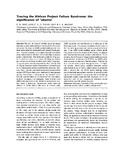Please use this identifier to cite or link to this item:
http://hdl.handle.net/10311/612| Title: | Tracing the African project failure syndrome: the significance of 'ubuntu". |
| Authors: | Rwelamila, P. D. Talukhaba, A .A. Ngowi, A.B. |
| Keywords: | Botswana Southern Africa Culture Project management Construction procurement system |
| Issue Date: | 1999 |
| Publisher: | Emerald http://www.emeraldinsight.com |
| Citation: | Rwelamila, P.D. et al. (199) Tracing the African project failure syndrome: the significance of "ubuntu", Engineering, Construction and Architectural Management. Vol.6, No.4, pp.335-346 |
| Abstract: | The lack of 'ubuntu'(African group solidarity) between project stakeholders in the Southern Africa Development Community (SADC) public building sector has been surrounded by controversy and strongly held opinions. The work reported in this paper attempts to indicate some salient issues affecting the relationshps between project stakeholders. The Botswana public building sector is used as a main case study and follwo-up studies are carried out involving another eight SADC countries. The paper addresses two propositions.First, that the lack of 'ubuntu' between project stakeholders is primarily due to an inappropriate project organizational structure.Second, that a default traditional construction procurement system (TCPS) provides a poor relationship management system. Information is obtained on the research areas through questionnaires to confirm executives, contract managers, site managers, trade foremen and skilled tradeperson on the dominant procurement system used in Botswana. Furthermore, senior technical officers of Public Works Ministries of another eight SADC countries are interviewed as a follow-up to the Botswana study. The primary conclusion to be drawn is that the building procurement system purported to be in use in the SADC public building sector differs significantly from that recommended in the theory, resulting in poor relationships between project stakeholders. This is primarily due to the use of inappropriate building procurement systems. In general, the TCPS in the SADC public buiding sector is used as a 'default system.' This has led to a situation where project management is a 'firefighting' activity, where group solidarity between project stakeholders is out of reach. Salient steps are proposed with proviso that the SADC public building sector should establish appropriate methods of selecting building procurement systems as a prerequisite in formulating appropriate project organizational structures which will bring the spirit of real co-operation between project stakeholders towards project success. |
| URI: | http://hdl.handle.net/10311/612 |
| ISSN: | 0969 9988 |
| Appears in Collections: | Research articles (Dept of Civil Engineering) |
Files in This Item:
| File | Description | Size | Format | |
|---|---|---|---|---|
| Rwelamila_ECAM_1999.pdf | Main article | 1.54 MB | Adobe PDF |  View/Open |
Items in DSpace are protected by copyright, with all rights reserved, unless otherwise indicated.
